Unit 4 Body language language points
文档属性
| 名称 | Unit 4 Body language language points |
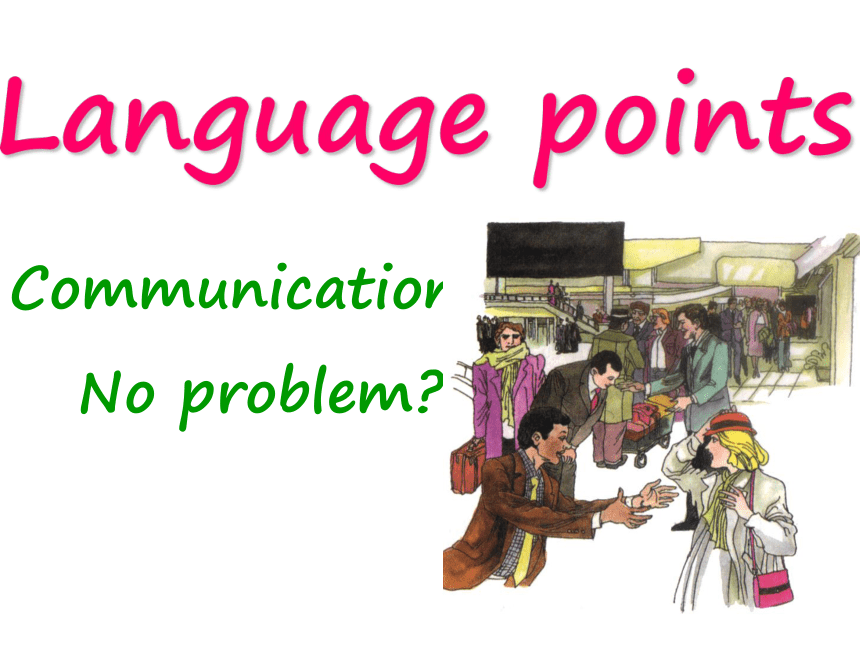
|
|
| 格式 | rar | ||
| 文件大小 | 710.4KB | ||
| 资源类型 | 教案 | ||
| 版本资源 | 人教版(新课程标准) | ||
| 科目 | 英语 | ||
| 更新时间 | 2010-11-15 00:00:00 | ||
图片预览

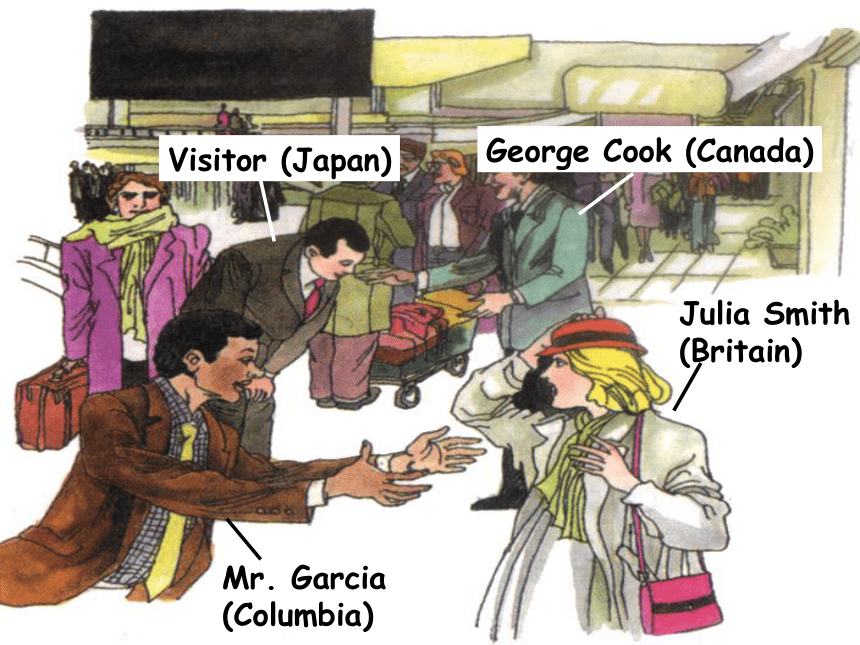
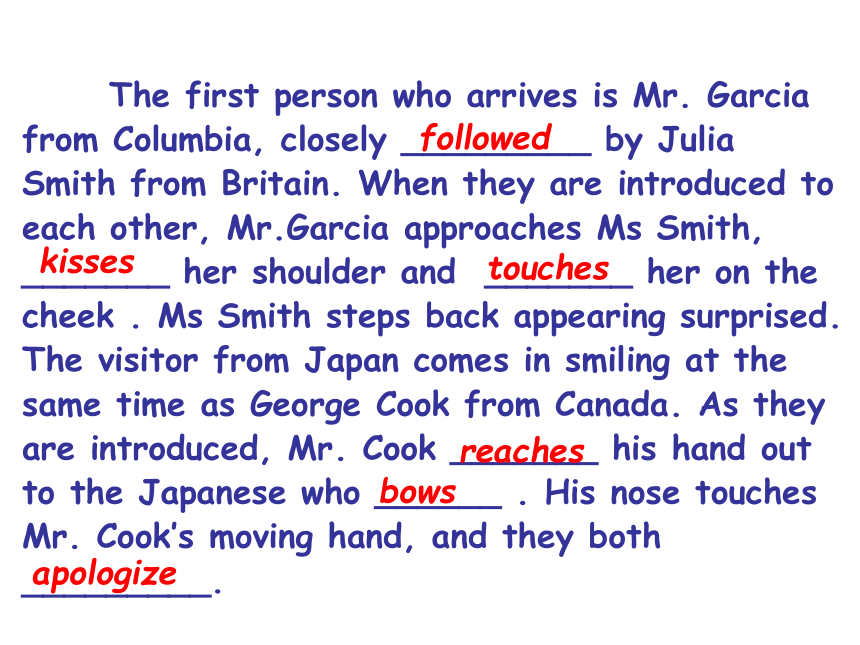
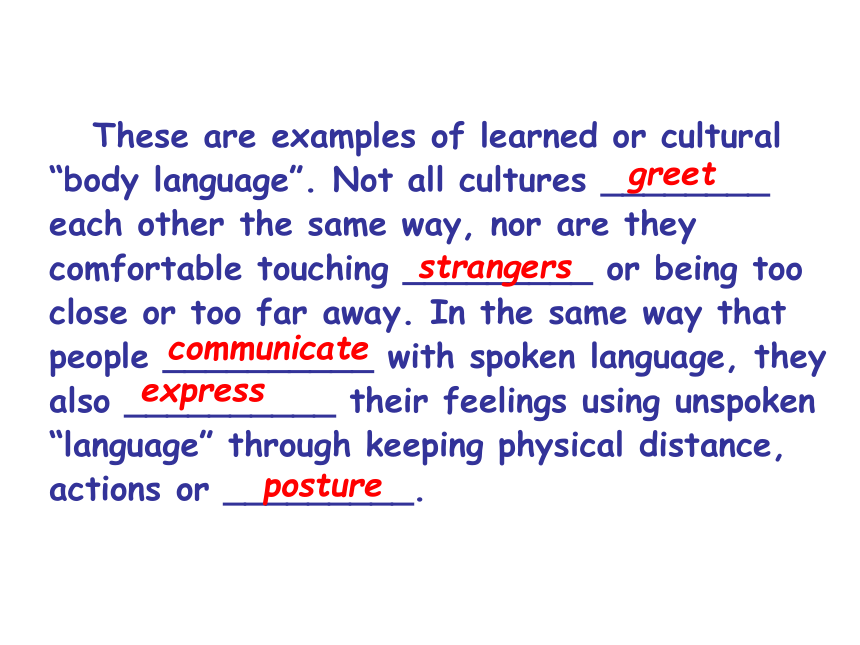

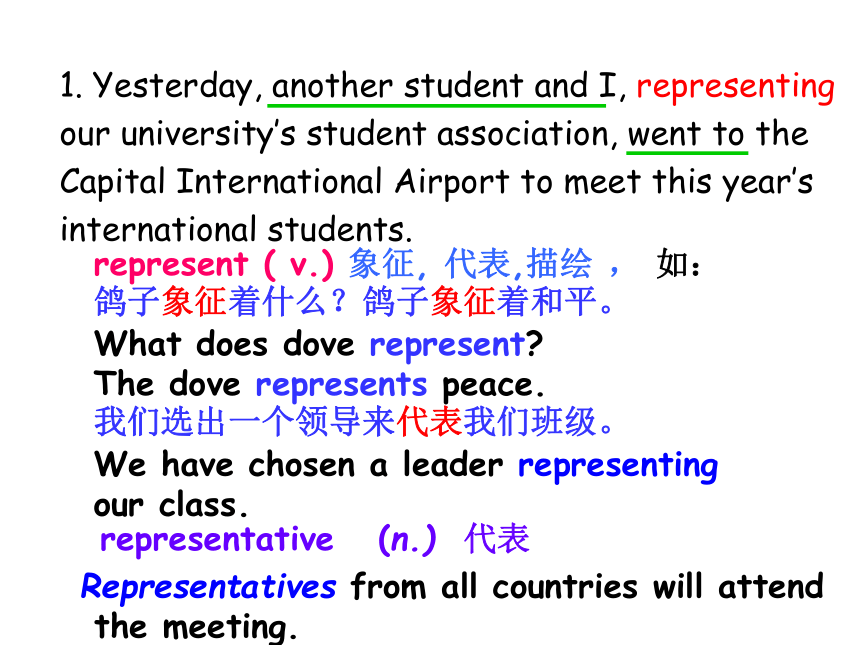
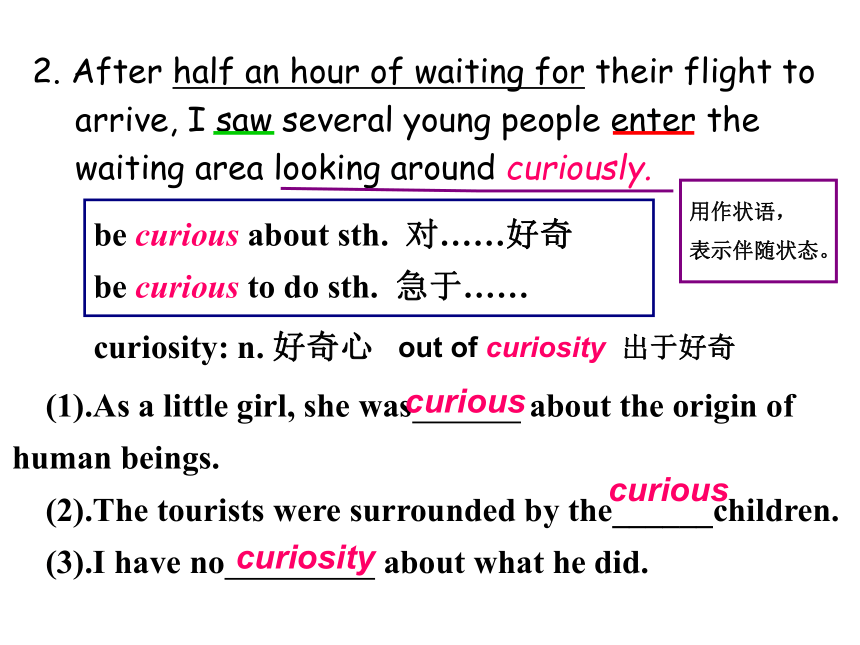


文档简介
课件24张PPT。Language pointsCommunication:
No problem?Mr. Garcia (Columbia)Julia Smith (Britain)Visitor (Japan)George Cook (Canada) The first person who arrives is Mr. Garcia from Columbia, closely _________ by Julia Smith from Britain. When they are introduced to each other, Mr.Garcia approaches Ms Smith, _______ her shoulder and _______ her on the cheek . Ms Smith steps back appearing surprised. The visitor from Japan comes in smiling at the same time as George Cook from Canada. As they are introduced, Mr. Cook _______ his hand out to the Japanese who ______ . His nose touches Mr. Cook’s moving hand, and they both _________. followedtoucheskissesreachesbowsapologize These are examples of learned or cultural “body language”. Not all cultures ________ each other the same way, nor are they comfortable touching _________ or being too close or too far away. In the same way that people __________ with spoken language, they also __________ their feelings using unspoken “language” through keeping physical distance, actions or _________.
expresscommunicatestrangersgreetpostureSummary : Body language varies from culture to culture. Not all members of all cultures behave the same way. We should try to grasp and respect each other’s culture in order to make good communication.1. Yesterday, another student and I, representing our university’s student association, went to the Capital International Airport to meet this year’s international students.represent ( v.) 象征, 代表,描绘 , 如:
鸽子象征着什么?鸽子象征着和平。
What does dove represent?
The dove represents peace.
我们选出一个领导来代表我们班级。
We have chosen a leader representing our class.
representative (n.) 代表Representatives from all countries will attend
the meeting.2. After half an hour of waiting for their flight to arrive, I saw several young people enter the waiting area looking around curiously.be curious about sth. 对……好奇
be curious to do sth. 急于……用作状语,
表示伴随状态。out of curiosity 出于好奇curiosity: n. 好奇心 (1).As a little girl, she was about the origin of human beings.
(2).The tourists were surrounded by the______children.
(3).I have no about what he did.curiouscuriouscuriosity3. The first person to arrive was Tony Garcia from Colombia, closely followed by Julia Smith from Britain. the first person to arrive “第一个到达的人”被动关系The last one ____ pays the meal.
Agreed.
A. arrived B. arrives C. to arrive D. arrivingC他走进房间,后面跟着他的家人。
He entered the room, followed by the rest of the family.
他走进房间,跟着他的家人。
He entered the room, following the rest of the family.4. Tony approached Julia, touched her shoulder and kissed her on the cheek.(1) approach v. & n. “接近 ”期末考临近了。
The final exam is approaching. (2) n. 方法;步骤;通路;通道
The approach of summer brings warm weather.
We have found a new approach to the study of English. 1)The __________ of summer brings hot weather.
2)Summer vocation is _________. I can’t wait to go back home.
A. coming B. on the way
C. approaching D. A, B and CapproachD kiss sb. on the cheek 亲吻某人的面颊v.+ sb. in/ on/ by + the 身体部位他抓住我的手臂,我就一拳打在他脸上。
He caught me by the arm, so I hit him in the face.____ apple fell from the tree and hit him on _____head.(2008浙江)
A. An,the B. The,the C. An,不填 D. The ,不填5. She stepped back appearing surprised and put up
her hands, as if in defence.appearing surprised: 伴随状语in defence:保卫;保护;为……辩护 6. a major misunderstanding “一个大误会”
major adj. 主要的;重要的;主修的;较多的
n. 成年人;主修科目;陆军少校
vi. 主修
我毕业于北京大学中文系。
I graduated from Peking University majoring in Chinese.7. apologize v. “道歉”
apologize to sb. for sth. / doing sth.
apology n.
make an apology to sb. for (doing) sth.Victor apologized for ____ to inform me of the change in the plan.
his being not able B. him not to be able
C. his not being able D. him to be not ableC8. When Darlene Coulon from France came dashing
through the door, she recognized Tony Garcia’s
smiling face.dashing through the door: 作伴随状语9. Not all cultures greet each other the same way, nor are they comfortable in the same way with touching or distance between people.部分否定
not 与all, both, every, everyone, everything等连用时,无论not位于这些词的前面还是后面,意为“并非所有的… …都… …” 全部否定---none, neither, no one, nothing等Everyone is not here.
“并不是人人都在这” “没有人在这”
Nobody is here.nor / neither 否定副词, 常置于句首, 句子要倒装, 即助动词/系动词/情态动词放在主语之前
I don’t like her, nor/neither does Lily.
I am not a nurse, nor/ neither is Lily.1. We haven’t enough books for ____; some of you will have to share.
somebody B. anybody C. everybody D. nobody
2. Bill wasn’t happy about the delay of the report by Jason, and ____ .
I was neither B. neither was I
C. I was either D. either was ICB10. However, people from places like Spain, Italy or South American countries approach others closely and are more likely to touch them.be likely to do … “很可能做某事”
= It is likely that …他很可能会成功
He is likely to succeed.
It is likely that he will succeed.11. In general, though, studying international customs can certainly help avoid difficulties in today’s world of cultural crossroads!in general “总的来说, 通常”=generally speakingIn general, what he said didn’t come to the point.avoid + n. / doing “避免…”还有哪些动词带doing作宾语?避免,错过,少延期
建议,完成,多练习
喜欢,想象,禁不住
承认,拒绝,与嫉妒
逃避,冒险,莫原谅
忍受,保持,不介意带doing作宾语的动词avoid, miss, put off
suggest, finish, practise
enjoy, imagine, can’t help
admit, deny, envy
escape, risk, excuse
stand, keep, mindThere is a story here in the paper about a 110-year-old man.
My goodness! I can’t imagine ____ that old.
A. to be B. to have been
C. being D. having beenC好奇地四处看
第一个到达的人
亲某人的脸颊
向后退
保卫,保护
大的误会
把手伸向…
正在那个时候
靠近某人
相反的
向某人点头
并不是所有
表达某人的感情
可能做某事
大致上说,总的来说
look around curiously
the first person to arrive
kiss sb. on the cheek
step back
in defence
a major misunderstangding
reach one’s hand out to..
just at that moment
move close to sb.
on the contrary
nod at sb.
not all
express one’s feelings
be likely to do sth.
in generalHomework1.
No problem?Mr. Garcia (Columbia)Julia Smith (Britain)Visitor (Japan)George Cook (Canada) The first person who arrives is Mr. Garcia from Columbia, closely _________ by Julia Smith from Britain. When they are introduced to each other, Mr.Garcia approaches Ms Smith, _______ her shoulder and _______ her on the cheek . Ms Smith steps back appearing surprised. The visitor from Japan comes in smiling at the same time as George Cook from Canada. As they are introduced, Mr. Cook _______ his hand out to the Japanese who ______ . His nose touches Mr. Cook’s moving hand, and they both _________. followedtoucheskissesreachesbowsapologize These are examples of learned or cultural “body language”. Not all cultures ________ each other the same way, nor are they comfortable touching _________ or being too close or too far away. In the same way that people __________ with spoken language, they also __________ their feelings using unspoken “language” through keeping physical distance, actions or _________.
expresscommunicatestrangersgreetpostureSummary : Body language varies from culture to culture. Not all members of all cultures behave the same way. We should try to grasp and respect each other’s culture in order to make good communication.1. Yesterday, another student and I, representing our university’s student association, went to the Capital International Airport to meet this year’s international students.represent ( v.) 象征, 代表,描绘 , 如:
鸽子象征着什么?鸽子象征着和平。
What does dove represent?
The dove represents peace.
我们选出一个领导来代表我们班级。
We have chosen a leader representing our class.
representative (n.) 代表Representatives from all countries will attend
the meeting.2. After half an hour of waiting for their flight to arrive, I saw several young people enter the waiting area looking around curiously.be curious about sth. 对……好奇
be curious to do sth. 急于……用作状语,
表示伴随状态。out of curiosity 出于好奇curiosity: n. 好奇心 (1).As a little girl, she was about the origin of human beings.
(2).The tourists were surrounded by the______children.
(3).I have no about what he did.curiouscuriouscuriosity3. The first person to arrive was Tony Garcia from Colombia, closely followed by Julia Smith from Britain. the first person to arrive “第一个到达的人”被动关系The last one ____ pays the meal.
Agreed.
A. arrived B. arrives C. to arrive D. arrivingC他走进房间,后面跟着他的家人。
He entered the room, followed by the rest of the family.
他走进房间,跟着他的家人。
He entered the room, following the rest of the family.4. Tony approached Julia, touched her shoulder and kissed her on the cheek.(1) approach v. & n. “接近 ”期末考临近了。
The final exam is approaching. (2) n. 方法;步骤;通路;通道
The approach of summer brings warm weather.
We have found a new approach to the study of English. 1)The __________ of summer brings hot weather.
2)Summer vocation is _________. I can’t wait to go back home.
A. coming B. on the way
C. approaching D. A, B and CapproachD kiss sb. on the cheek 亲吻某人的面颊v.+ sb. in/ on/ by + the 身体部位他抓住我的手臂,我就一拳打在他脸上。
He caught me by the arm, so I hit him in the face.____ apple fell from the tree and hit him on _____head.(2008浙江)
A. An,the B. The,the C. An,不填 D. The ,不填5. She stepped back appearing surprised and put up
her hands, as if in defence.appearing surprised: 伴随状语in defence:保卫;保护;为……辩护 6. a major misunderstanding “一个大误会”
major adj. 主要的;重要的;主修的;较多的
n. 成年人;主修科目;陆军少校
vi. 主修
我毕业于北京大学中文系。
I graduated from Peking University majoring in Chinese.7. apologize v. “道歉”
apologize to sb. for sth. / doing sth.
apology n.
make an apology to sb. for (doing) sth.Victor apologized for ____ to inform me of the change in the plan.
his being not able B. him not to be able
C. his not being able D. him to be not ableC8. When Darlene Coulon from France came dashing
through the door, she recognized Tony Garcia’s
smiling face.dashing through the door: 作伴随状语9. Not all cultures greet each other the same way, nor are they comfortable in the same way with touching or distance between people.部分否定
not 与all, both, every, everyone, everything等连用时,无论not位于这些词的前面还是后面,意为“并非所有的… …都… …” 全部否定---none, neither, no one, nothing等Everyone is not here.
“并不是人人都在这” “没有人在这”
Nobody is here.nor / neither 否定副词, 常置于句首, 句子要倒装, 即助动词/系动词/情态动词放在主语之前
I don’t like her, nor/neither does Lily.
I am not a nurse, nor/ neither is Lily.1. We haven’t enough books for ____; some of you will have to share.
somebody B. anybody C. everybody D. nobody
2. Bill wasn’t happy about the delay of the report by Jason, and ____ .
I was neither B. neither was I
C. I was either D. either was ICB10. However, people from places like Spain, Italy or South American countries approach others closely and are more likely to touch them.be likely to do … “很可能做某事”
= It is likely that …他很可能会成功
He is likely to succeed.
It is likely that he will succeed.11. In general, though, studying international customs can certainly help avoid difficulties in today’s world of cultural crossroads!in general “总的来说, 通常”=generally speakingIn general, what he said didn’t come to the point.avoid + n. / doing “避免…”还有哪些动词带doing作宾语?避免,错过,少延期
建议,完成,多练习
喜欢,想象,禁不住
承认,拒绝,与嫉妒
逃避,冒险,莫原谅
忍受,保持,不介意带doing作宾语的动词avoid, miss, put off
suggest, finish, practise
enjoy, imagine, can’t help
admit, deny, envy
escape, risk, excuse
stand, keep, mindThere is a story here in the paper about a 110-year-old man.
My goodness! I can’t imagine ____ that old.
A. to be B. to have been
C. being D. having beenC好奇地四处看
第一个到达的人
亲某人的脸颊
向后退
保卫,保护
大的误会
把手伸向…
正在那个时候
靠近某人
相反的
向某人点头
并不是所有
表达某人的感情
可能做某事
大致上说,总的来说
look around curiously
the first person to arrive
kiss sb. on the cheek
step back
in defence
a major misunderstangding
reach one’s hand out to..
just at that moment
move close to sb.
on the contrary
nod at sb.
not all
express one’s feelings
be likely to do sth.
in generalHomework1.
同课章节目录
